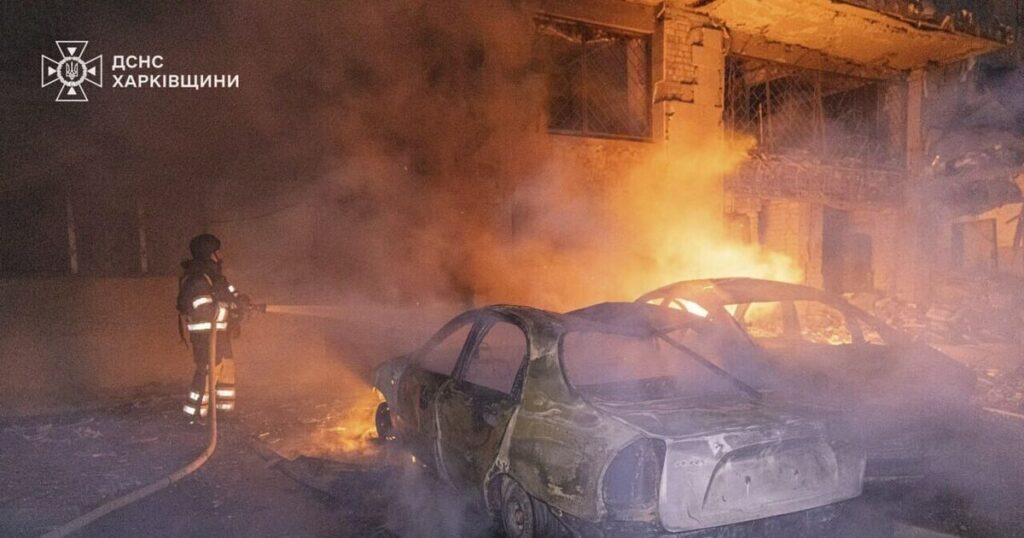The number of Russian troops killed or wounded in Ukraine has topped one million, military officials in Kyiv said on Thursday, describing the huge price that Moscow has paid for its three-year-old invasion.
The claim by the General Staff of the Ukrainian armed forces is in line with Western intelligence estimates.
The UK Ministry of Defence also said in a statement posted Thursday on X that Russia has suffered more than one million casualties, including roughly 250,000 killed since it launched the full-scale invasion on February 24 2022.
On June 3, the Centre for Strategic and International Studies in Washington said Russia would likely hit the mark of one million casualties this summer in what it called “a stunning and grisly milestone”.
Russia last reported its military casualties early in the war when it acknowledged that about 6,000 soldiers had been killed. Earlier this year, the General Staff of the Russian armed forces claimed that Ukrainian military losses had topped one million.
Ukrainian President Volodymyr Zelenskyy last spoke of Ukrainian military losses in February, when he said in an interview that 45,100 troops had been killed and about 390,000 injured.
The mutual claims of the other side’s losses could not be independently verified.
The casualty estimates came as Russian forces pummelled Ukraine with drones and other weapons, killing three people and injuring scores of others despite international pressure to accept a ceasefire.
According to the Ukrainian air force, Russia launched 63 drones and decoys at Ukraine overnight. It said that air defences destroyed 28 drones while another 21 were jammed.
Ukrainian police said two people were killed and six were injured in the past 24 hours in the eastern Donetsk region, the focus of the Russian offensive. One person was killed and 14 others were also injured in the southern Kherson region, which is partly occupied by Russian forces, police said.
The authorities in Kharkiv, Ukraine’s second-largest city, said 18 people, including four children, were injured by Russian drone attacks overnight.
Kharkiv Mayor Ihor Terekhov said Russian drones targeted residential districts, educational facilities, nurseries and other civilian infrastructure.
“Kharkiv is holding on. People are alive. And that is the most important thing,” Mr Terekhov said.
Russia has launched waves of drones and missiles in recent days, with a record bombardment of almost 500 drones on Monday and a wave of 315 drones and seven missiles overnight on Tuesday.
Ukraine responded to the Russian attacks with drone raids.
Russia’s Defence Ministry said that air defences downed 52 Ukrainian drones early on Thursday, including 41 over the Belgorod region that borders Ukraine.
Regional Governor Vyacheslav Gladkov said three people were injured by Ukrainian attacks.
The recent escalation in aerial attacks has come alongside a renewed Russian battlefield push along eastern and northeastern parts of the more than 1,000-kilometre (over 600-mile) front line.
While Russian missile and drone barrage have struck regions all across Ukraine, regions along the front line have faced daily Russian attacks with short-range exploding drones and glide bombs.
On Thursday, the Russian Defence Ministry claimed its troops captured two more villages in the Donetsk region, Oleksiivka and Petrivske. The Ukrainian military had no immediate comment on the Russian claim.
The attacks have continued despite discussions of a potential ceasefire in the war.
During their June 2 talks in Istanbul, Russian and Ukrainian negotiators traded memorandums containing sharply divergent conditions that both sides see as nonstarters, making a quick deal unlikely.
In Rome, Nato Secretary-General Mark Rutte commended US President Donald Trump for his “crucial” move to start direct peace talks with Russian President Vladimir Putin.
At the same time, Mr Rutte criticised Mr Putin for appointing his aide Vladimir Medinsky as the top negotiator for the talks in Istanbul.
Mr Medinsky ascended through the Kremlin ranks after writing a series of books exposing purported Western plots against Russia and denigrating Ukraine.
“I think that the Russians sending this historian now twice to these talks in Istanbul, trying to start with the history of 1,000 years ago and then explaining more or less that Ukraine is at fault here, I think that’s not helpful,” Mr Rutte said.
“But at least step by step, we try to make progress.”
Also on Thursday, German Defence Minister Boris Pistorius arrived in Kyiv on an unannounced visit, noting the stepped-up Russian attacks send a message from Moscow that it has “no interest in a peaceful solution at present,” according to German news agency dpa.
Mr Pistorius said his visit underlines that the new German government continues to stand by Ukraine.
“Of course this will also be about how the support of Germany and other Europeans will look in future – what we can do, for example, in the area of industrial co-operation, but also other support,” he said.


